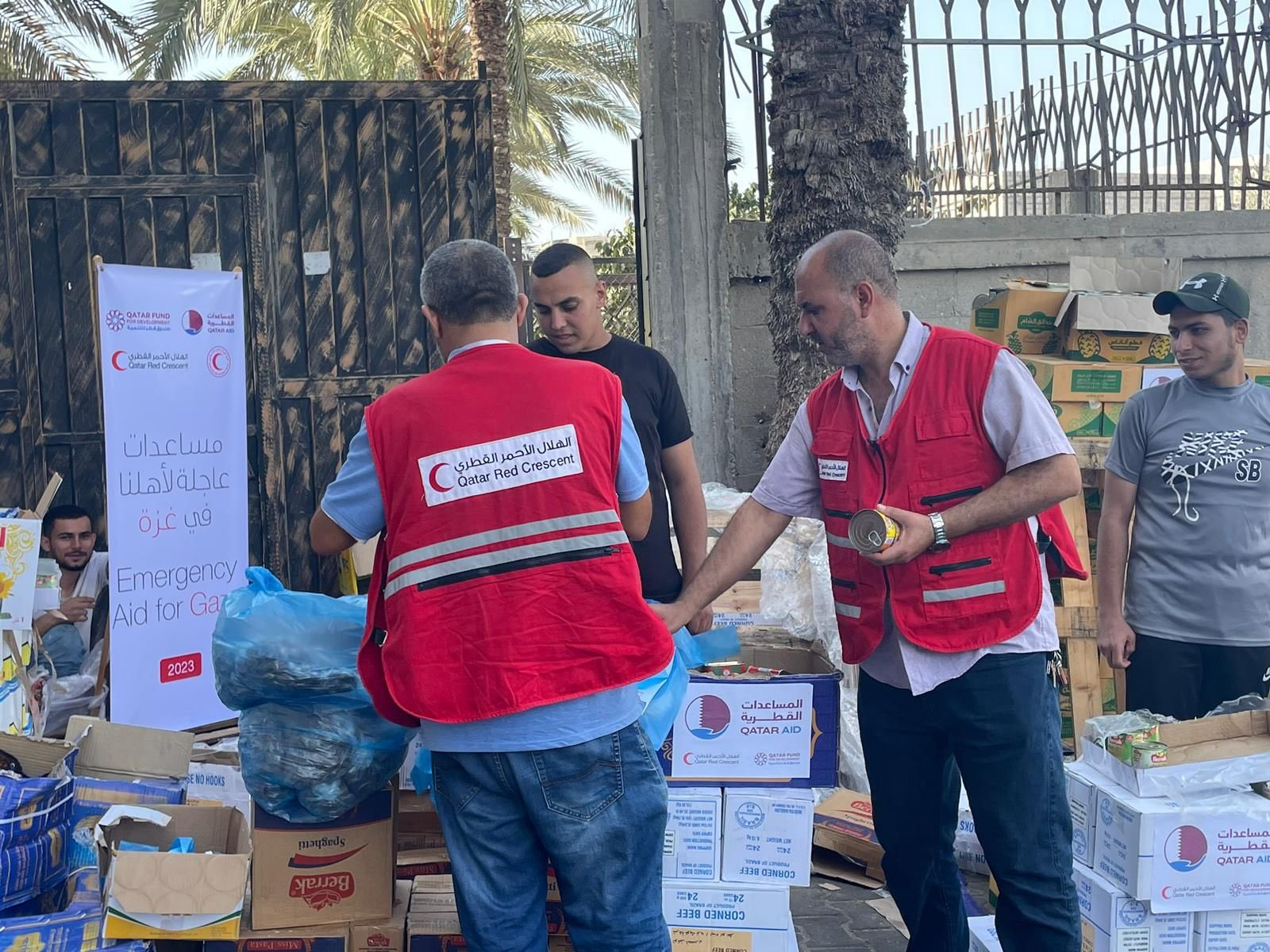Palestine briefed the Hague on the extent of destruction Israel caused.
Qatar Red Crescent Society (QRCS) began distributing aid in Gaza on Wednesday as the Palestinian enclave continues to face a complete Israeli siege and a brutal bombardment campaign.
The aid was sent by Qatar to Egypt’s Al-Arish Airport last week and finally entered Gaza after the Rafah Crossing briefly opened on Sunday.
Qatar has sent three aid flights to Egypt that carried a total of 124 tonnes of food and medical aid for Gaza. QRCS distributed a total of 375 food parcels to about 1,875 beneficiaries from displaced families who are sheltering at the Al Amal Hospital in Khan Yunis, south of Gaza.
“The QRCS team will urgently follow up on the distribution of hundreds of food parcels with the support of QFFD to dozens of displaced families in the vicinity of the Al Quds Hospital in cooperation with the Palestinian Red Crescent,” QRCS added.
Gaza is currently witnessing a growing humanitarian catastrophe in light of non-stop Israeli bombardment as well as a complete siege on the Palestinian enclave. Israel has killed at least 6,546 Palestinians, including at least 2,704 children since it launched its most brutal campaign on the besieged Strip to date.
Israel announced an embargo on Gaza on 8 October, preventing more than 2 million people from access to basic necessities, such as water and electricity. Announcing the full embargo, Israel’s Defence Minister Yoav Gallant described locals in Gaza as “human animals”.
Fewer than 70 trucks have been granted the green light from Israel to cross over from Egypt to Gaza. However none of the trucks contained fuel shipments and the limited aid has been described by humanitarian agencies as a mere “a drop in the ocean” of the needs of Gaza’s population.
By Tuesday, Gaza’s health sector officially collapsed due to a lack of resources to treat thousands of injured, with witnesses on the ground saying doctors have been operating on patients without anaesthesia.
Separately on Monday, the UN Relief and Works Agency for Palestine Refugees (UNRWA) warned that the absence of fuel will force humanitarian response to stop.
“In three days, UNRWA will run out of fuel, critical for our humanitarian response across the Gaza Strip,” Philippe Lazzarini, UNRWA’s Commissioner-General, said in a statement.
The Israeli aggression has forcibly displaced at least one million people in Gaza, many of which are taking shelter inside schools and hospitals.
On Wednesday, Palestine’s foreign minister Riyad al-Malki briefed the president of the International Criminal Court (ICC) in the Hague, Piotr Hofmanski, on the extent of destruction caused by Israel.
“Malki stressed the need for the ICC to complete its criminal investigation and to bring the Israeli perpetrators of war crimes to justice, maintaining that the cause of the crimes committed today by Israel and its officials is the lack of accountability,” Palestine’s news agency (Wafa) reported, citing Al-Malki.
The United Nations Security Council failed at least three times to agree on a ceasefire resolution, with Israel’s western allies repeatedly vetoing all draft proposals.
On Wednesday, the United States and the United Kingdom blocked a Russian draft resolution that called for a humanitarian ceasefire and a withdrawal of Israel’s directive for Gaza’s civilians to relocate south.
Meanwhile on Tuesday, Qatar’s Amir Sheikh Tamim bin Hamad Al Thani slammed Israel’s “barbaric and unprecedented bombing” of Gaza.
Sheikh Tamim also took aim at those standing in support of Israel as it continues its bombing campaign on Gaza, where half of the population are under the age of 15.
“We are saying enough is enough. It is untenable for Israel to be given an unconditional green light and free license to kill, nor is it tenable to continue ignoring the reality of occupation, siege and settlement,” Sheikh Tamim told the Shura Council in Doha .
“We would like to ask those who have aligned with the war, and those acting to gag any dissenting opinion: What would come in the aftermath of this war?” he said.







